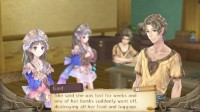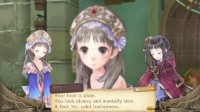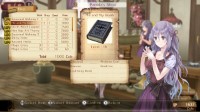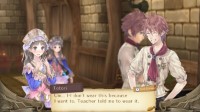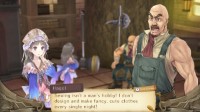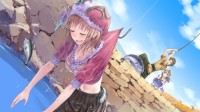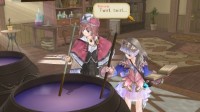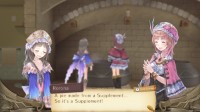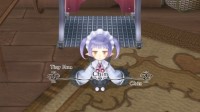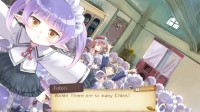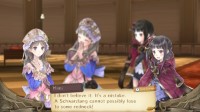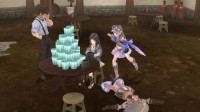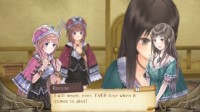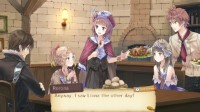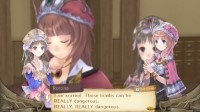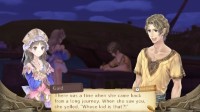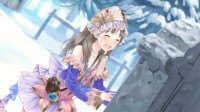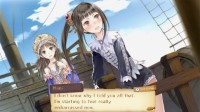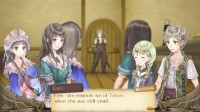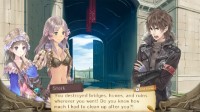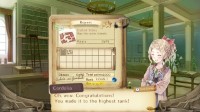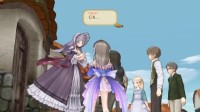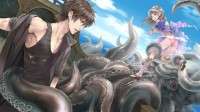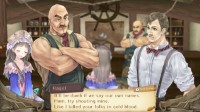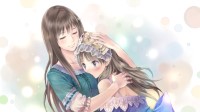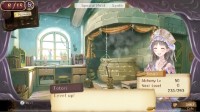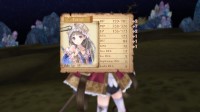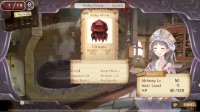Atelier Totori
Playtime: 49.5 Hours
Finished 10 February 2024.
Played the DX version on Switch, NG only and with no plans for a NG+ run. Got the Rorona Ending, but would have been well on-pace for every ending flag EXCEPT the wealth end because of money reasons. The only reason why I didn't go through with doing so is that I ended up with very uneven friendship values so I figured that I'd just trigger a specific end because the True Ending is impossible for me right now anyway. Doing so also let me skip about 5 months at the end of the game from Y6M1D18 to Y6M6D1 because I was quite fatigued of the game by the end and just wanted to clean it up. Didn't feel like finagling the rest of the schedule to manage the remaining events, even though it would have been quite easy to do so. I'll list a number of other "achievements" down below, since there's always a lot of detail that I can go into with those.
Miscellaneous Achievements:
- Defeated the Flauschtraut and reached Frontier Village (Normal End requirement)
- Made 2 return trips to Frontier Village to defeat Evil Face (True End requirement)
- Fully explored Liechtein Soehnle and defeated all postgame bosses within
- Defeated all other postgame bosses on the map except Ozean Kaiser & Orthogalaxen superbosses
- Reached Adventurer and Alchemy Lv50 on Totori. Rorona also at 50, Mimi at 49 (flag at 50), Sterk at 47
- Achieved Galaxy rank in Year 5, finished the game with 3780 out of 4000 points.
- Fully explored all areas in the game, with the exception of Orthogalaxen
- 60+ friendship with all main story party members. Didn't use DLC characters
- Finished all side event chains: Filly & Tiffani, Cooking Class, Specialty Liquor, Frontier Village
- Got all 5 Chims - at least 3 on pace for 9 large pies, beyond requirement for Chim ending
- Created optimal endgame gear with Halmolium ingots, Scale Cloth & Velvetis, good accessories
- Created optimal endgame consumables: N/A, Himmelstern, Dark Water, Elixir, Secret Remedy, etc.
- Synthesized every item in the game, finishing with a 120 quality high-trait Ruby Prism
- Achieved or on pace to reach all ending flags except the Wealth end. Not too far off True End!
Coming from Rorona DX, the lack of QOL in Totori DX is quite shocking. For a series focused primarily on synthesis, it's kind of surprising that it took until the last game in the Arland trilogy for some basic sorting and filtering options; it's quite unfortunate that this game in particular got the worst treatment in the DX versions, as Rorona's remake was released afterwards with these conveniences included. It feels like it should be a rather minor detail, but for the amount of time actually spent looking for specific traits in your ingredient basket, trying to plan out good syntheses was more annoying than it should have been.
Outside of that, the drastic difference in the freedom of this game compared to the railroaded approach of Rorona is very stark, and gives room for each of the two to have very different feels while still maintaining pretty much all of the core gameplay flows. Without the pressure of having to make very specific items within a restricted timespan, the pacing feels more naturally bound to your capabilities at any moment, though it can also make the game feel a bit aimless at times. In Rorona, each main assignment can be used as a gauge of your minimum expected progress, while the side objectives are useful for determinine the strength of your party and your skill at time and resource management (to an extent - Rorona DX is quite easy). In comparison, Totori's license ranks are only ever an issue if you decide to wing it for the entire playthrough without ever planning out trips or synthesis trips properly. In my case, I achieved the highest possible rank pre-renewal after just over a year into the game (Diamond rank at ~Y2M10 or so) which meant I had almost 2 more years with no clear objectives other than to do more small tasks, earn money, and upgrade my gear. I don't count it as a knock against the game at all since it's really cool how much freedom you have here, but there was a bit of a motivational void for me to do anything during that time since there wasn't much else to explore. For 2 in-game years I was stuck in the early-game playpen while knowing that better equipment and item upgrades were just outside of that area, and it kind of sucked knowing how temporary all of my gear really would be by the time I had a chance to use it. I almost wish you had the option of starting the post-renewal segment earlier.
Outside of the time-gated events, the game really ends up feeling like a sandbox game. Craft this, explore that, defeat this, gather that - for anyone who likes checklists this game is just a constant stream of dopamine, since pretty much any kind of real activity in this game will give you points. Completing quests of each type, defeating monsters of every type, etc. Obviously, the game heavily encourages you to improve your synthesis skills for better bombs, equipment, and healing - they're vastly more important than levels as far as stats and combat efficiency go. A bit of a flipside to this is that your time is drained far more ruthlessly than before now; gathering and fighting takes up time, and travel times are much longer than in Rorona - double digits are not uncommon, even in the earliest parts of the game. It really doesn't help that you have two towns in this game to transit between, with each of them having different shops to register your goods at - making your plans for synthesis even harder (until you get the Warp Gate in the late game). Even after making the boots upgrades partway into the game, I'd say roughly 70-80% of elapsed calendar time is taken up entirely by travel. Boat travel to Frontier Village by the endgame is around 20 days with the upgraded boat, and almost double that without! Longer syntheses are also common; for example, the Ruby Prism takes 10 full days compared to Rorona's 5. What all of this means is that your schedule planning has to be much more careful and meticulous, especially for requests. There's a really strange balance in this game between the careful planning for optimization alongside the giant stretch of time with nothing to do but wait for your license to be renewed.
I haven't ranted much about the story here and it's because there honestly isn't much to say for better or worse. The gist of it is that Totori wants to become an adventurer to find her mother, who went missing however many years ago. She proves herself enough to get a beginner's license in the tutorial section of the game (kind of), then has 3 years to grow into a decent adventurer (which is extremely easy, as previously stated); there are NO story developments during this time. After she gets her license renewed, she learns a bit more about her mother and travels to Frontier Village to find her, defeating the famed and feared Flauschtraut along the way. There, she learns of her mother's death and the demon holding the village hostage (kind of); through a couple more journeys to the village she eventually confronts and defeats the demon, which is the true ending to the main plot threads. It's decent story, if a little simple - my only problem is that there is a 3 year gap between the beginning of the game and any actual developments. The character growth that Totori and her family go through is very nice though; I always felt that the Atelier games do a surprisingly good job at showing how characters mature gradually over time, reflecting the years of time passed in-game.
Speaking of characters, the new ones are quite hit-or-miss. Gino is a stereotypical annoying shrimpy kid who doesn't really grow out of it, Peter is a despicable combination of creepy and lazy, and Marc is simply incredibly obnoxious and absolutely unlikeable with his only redeeming factor being that he gives speed upgrades for the cart and boat. On the other hand, Gerhard is a pretty cool character, Filly is an entertaining stand-in for Esty, and I quite like Mimi, Melvia, and all of the main story characters (Guid, Ceci, Piana, Pilca, etc.). I feel like I have to consciously remind myself that this is a Japanese game from a slightly different time where the creepy and obnoxious dude tropes were more common, but then again I've never actually liked those archetypes to begin with and they don't work any better here. I wish we could have more entertaining male characters - though from what it sounds like, I'll probably have to wait until the Dusk trilogy for that. The old characters that came back from Rorona are almost all as good as ever though. It's really nice to see how they've grown (or not) over the years - Rorona trying and failing at teaching alchemy to new students, Sterk still playing at being a wandering knight, and Cordelia still standing at ~4 feet fall. The continuity between the games does such a good job at breathing some life into the the world of Arland.
There are tons of other minute details that could be discussed, but outside of what I've mentioned above the game doesn't feel particularly different from Rorona DX. Combat and synthesis still generally follows the same formulas with minor adjustments, and details of gear and character balancing don't really matter when almost all combat is equally trivialized with good bombs and equipment. What I can say is that while the game didn't have a great first impression with its clunkiness, feeling like a pretty big step back from Rorona DX (I know it was released before!) I eventually learned to love the game as its own thing separate from the other two games in the Arland trilogy, both of which are a bit more linear in progression. As of writing this, I think Rorona DX is still my favorite of the Atelier games, but this was worlds better than the first few hours would have me believe. I just need a little break before I'm ready to start Meruru and finish the trilogy!
